DANCING AROUND ADOLESCENCE
It happened with You’re A Good Man, Charlie Brown, that peculiar, often cloying, problem of adult actors playing unfledged kids. There’s an unavoidable condescension that’s not lost on grown-ups — even less so with young folks — when performers stoop to be small.
But sometimes, as with Clare Barron’s 2017 Dance Nation (a Pulitzer Prize finalist), this counter-casting turns bittersweet, maybe brilliant. Now in a compelling — and not-cutesified — Chicago premiere by director/choreographer Lee Sunday Evans, Steppenwolf Theatre Company presents a 112-minute group portrait of the price of change. The play’s artificial youth tempers alleged innocence with conditional maturity. By play’s end we feel just how much irretrievable worth got lost in the past or buried in the future.
In the Upstairs Stage, configured as a runway cutting through the crowd, Steppenwolf’s mostly middle-aged cast of nine play mostly pre-teens from Liverpool, Indiana caught up in a national competitive dance contest. Instantly, we sense the visceral disconnect between the later-blooming looks of post-young actors and the fearsome, non-negotiable emotions that tear up their characters (“I want my life to start!”).
Geez Louise, all their dreams, past and future, will come true if they can just win the big contest in Tampa!
The casting contradictions pay off: Barron wants to remind us how absolute adolescence can be, with its delusions that we’re gonna live forever — except for next weekend when suddenly the slightest setback becomes another argument in a suicide note or when a proven pal instantly turns into a BFF to occupy the “center of the universe.” Barron astutely conveys it all through performers who, only obliquely suggesting developing dancers, have already seen life written all over their faces and forms.
As we watch this “work-in-progress” ensemble rehearse their weird routine for the nationals (a stupidly stylized evocation of Gandhi called “World on Fire”), Barron employs sad little solo speeches, as well as the kids’ desultory encounters, to convey the whirlwinds of unprocessed energy and unappeasable desire that convulse these youngsters. We’re caught up, like these middle-school transients, in their irresistible, seemingly inevitable, and often graphically crude, torrents of insecurity, impulsivity, tribal tantrums, peer pressure, rivalries, ambition (“I hope I get it!”), braggadocio (“My pussy is perfect!”), sisterly solidarity, sexual confusion, heartbreak and breakups, and assorted “end of the world” embarrassments.
Barking orders and affecting encouragement is Dance Teacher Pat (Tim Hopper), a possible perv who wants to bring out their best at a cost he won’t calculate. He obtusely lectures them on how lucky they are and how much their every step should come from suffering. As the only other adult, Audrey Francis plays the alternately supportive or meddlesome mothers, as well as Vanessa, a girl whose terrible injury starts the show with a near-sadistic touch of gallows humor.
Defying such generic obstacles as mom’s cancer or dad’s depression, the seven ex-children are caught in their own crossfire. They include Sofia (Ariana Burke), who experiences her first period in the most proudly public way possible; defensively boastful Ashlee (Shanesia Davis), who may well suffer from too much security; Connie (Adithi Chandrashekar), challenged to dance Gandhi non-violently when she’d rather play with her toy horses; Maeve (Ellen Maddow), a mousey maiden with bad hair who’s convinced she can fly; and token boy Luke (Torrey Hanson), trying to hold onto the moment when everything is in flux.
Then there are the most extreme 13-year-olds, mean girls in the making: Self-mutilating Zuzu (Caroline Neff) is consumed with competition (to the point of “choking up” under stress) and will quit rather than lose. In contrast, trophy-winning Amina (Karen Rodriguez), who secretly wants to lose, succeeds too easily to learn anything for future benefit. The corrosive polarities between Zuzu and Amina deliver the play’s sardonic subtext: The only choice these kids face is to triumph and be alone or to lose but keep their friends as consolation. Except for the youngsters’ obsession with a cure-all future, it’s a stark and unedifying lesson that makes you think that real kids should miss this one-act.
No question, Dance Nation, which combines LOL with TMI, will trigger and expose your “inner teenager.” Its toxic fusion of self-inventing girl talk and adult put-downs can’t help but take us back, screaming and kicking. It feels as awkward returning to so much angst as it is to watch Steppenwolf’s aging actors spring into literal formation. Strangely and sadly, we get to both miss what we lost and be glad it’s gone.
photos by Michael Brosilow
 Dance Nation
Dance Nation
Steppenwolf Theatre Company
Steppenwolf’s Upstairs Theatre
1650 N Halsted Street
ends on February 2, 2020
for tickets, call 312.335.1650
or visit Steppenwolf
for more shows, visit Theatre in Chicago
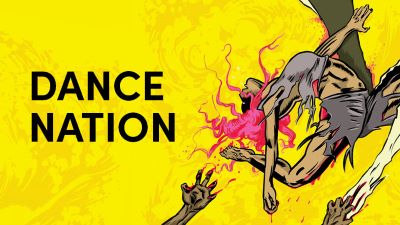
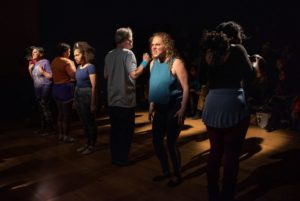

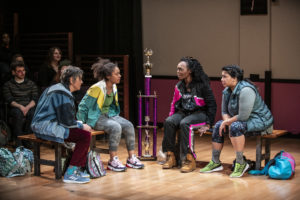
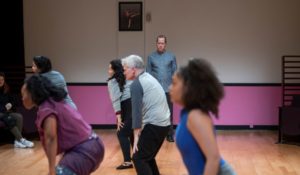
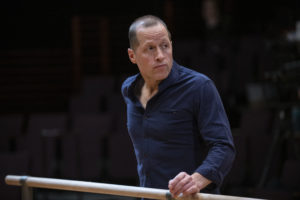

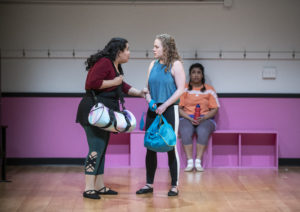
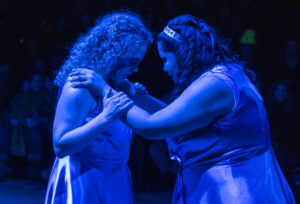

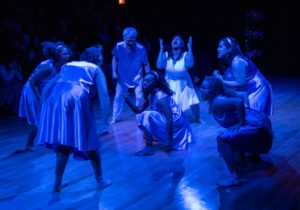

{ 3 comments… read them below or add one }
So, Larry, I saw this at the San Francisco Playhouse in October, and it was a dull disaster. I couldn’t figure out what they were going for, but it felt like a flat farce. Did you see it as satire?
I see it as a psychological period piece (no pun intended) more than a satire, because I think the playwright takes the dancers’ trauma seriously enough to trigger numerous shocks of recognition in the audience.
It’s played very realistically on this stage.
Hope that helps…
This play was poorly written claptrap! It was dull, impossible to believe in, despite great performances by wonderful actors. The narrative was diluted by insipid breakouts of monologues that went too far, and utterly stupid segments that tried my patience. I can’t believe anyone who sees this play doesn’t see it for what it is! Awful.